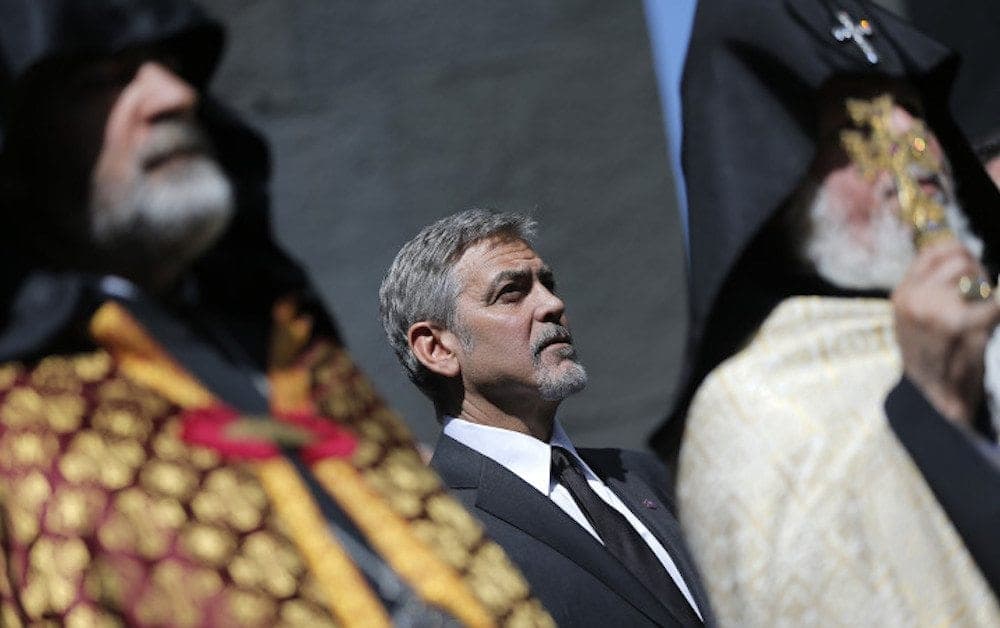Actor George Clooney on Sunday was in Armenia to insist that “the whole world” remembers a massacre by Ottoman Turks generally seen as the first genocide of the 20th century, four months to the day before Pope Francis plans to visit the country and is expected to deliver a similar acknowledgment.
Clooney on Sunday presented a $1.1 million award to a Burundi woman who offered sanctuary to thousands of orphans in the middle of a civil war there, and who was selected by Armenian philanthropists for the award.
The killing of more than 200 Armenian intellectuals on April 24, 1915 is regarded as the start of the massacre that is widely viewed by historians as the first genocide of the 20th century in which they estimate 1.5 million Armenians were slaughtered.
Turkey, the successor to the Ottoman Empire, vehemently rejects that the deaths constitute genocide, saying the toll has been inflated and that those killed were victims of civil war and unrest.
Clooney has been a prominent voice in favor of countries recognizing the killings as genocide, which the U.S. hasn’t done.
Before he presented the award, Clooney reminded the audience that Adolf Hitler once reportedly said: “Who remembers Armenia?” Clooney said: “The whole world.”
Clooney presented the first Aurora Prize, an award recognizing an individual’s work to advance humanitarian causes, to Marguerite Barankitse, who saved thousands of lives and cared for orphans and refugees amid the Burundi civil war.
“By recognizing Marguerite Barankitse’s courage, commitment and sacrifice, I am hopeful that she can also inspire each one of us to think about what we can do to stand up on behalf of those whose rights are abused and are in most need of our solidarity or support,” Clooney said.
President Barack Obama declined on Friday to refer to the 1915 massacre as genocide, breaking a key campaign promise as his presidency nears an end. Obama called the massacre the first mass atrocity of the 20th century and a tragedy that mustn’t be repeated.
Clooney, along with Armenian leaders and international dignitaries, earlier on Sunday attended a service at a hilltop memorial in the capital, Yerevan, led by Armenian church leader Catholicos Karekin II to commemorate the massacre victims.
In Turkey, President Recep Tayyip Erdogan issued a message commemorating Armenians who died in 1915, without making any reference to the massacre.
In a statement that was read during a ceremony at an Armenian church in Istanbul, Erdogan said he welcomed the commemoration “to share the grief endured by the Ottoman Armenians, as well as to honor their memories.”
Erdogan criticized efforts “to politicize history through a bitter rhetoric of hate and enmity and strive to alienate the two neighboring nations.”
Pope Francis is set to visit Armenia June 24-26, after expressing his desire to do so during an airborne press conference coming back from his Africa tour in November.
The Armenia foray is bound to cause diplomatic tensions with Turkey, if recent experience is to be taken into consideration.
On April 12, 2015 Francis celebrated a Mass in St. Peter’s Basilica to mark the 100th anniversary of mass killings regarded by Armenians as a genocide and by Turks as a civil war. On that occasion, he described the events as “the first genocide of the 20th century,” prompting Turkey to recall its Vatican ambassador in protest.
It wasn’t until early 2016 that Turkey sent the ambassador back to Rome.
Beyond the genocide debate, for the Argentine pontiff the visit to Armenia has a meaning that goes beyond what happened 100 years ago. In the days previous to the Mass he celebrated in 2015, he met with a group of Armenian bishops.
“I think with sadness about those regions such as Aleppo [Syria], which a hundred years ago were a safe harbor for the few survivors,” Francis said. “Recently these regions have seen the endurance of Christians, and not only Armenians, put at risk.”
Although the assault on Armenians a century ago isn’t considered to have been motivated primarily by religious reasons, the victims were largely Christian and Francis pointed it out.
“Not few of your brothers and sisters,” Francis said, “pronounced Christ’s name as they shed their blood or died of starvation during the exodus into which they were forced.”














